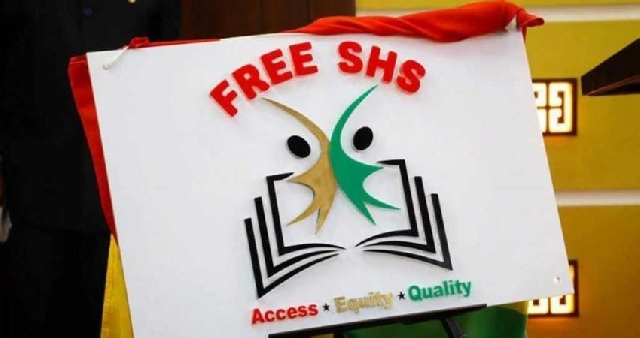Free SHS and NDC’s dilemma: A look into the future
 Free Senior High School Policy was began by the erstwhile Nana Akufo-Addo-led administration
Free Senior High School Policy was began by the erstwhile Nana Akufo-Addo-led administration
In the early days of the NDC government, discussions surrounding the Free Senior High School (Free SHS) policy have sparked concerns. While the challenges associated with the policy's implementation are well-known, particularly its impact on secondary education, recent developments highlight the urgent need for effective management.
It is public knowledge that the previous NPP administration struggled to meet its financial commitments to the Conference of Heads of Assisted Secondary Schools (CHASS), leading to calls for postponing the reopening of secondary schools. However, the Ghana Education Service (GES) decided to adhere to the original reopening schedule. In response, comments such as “Parents should provide their wards with more food when reporting” and “Parents should be allowed to pay fees to support their wards' education” have emerged.
On the surface, these remarks appear to offer practical solutions to ease the financial strain of the Free SHS policy on the new government. They could also pave the way for future discussions on cost-sharing in secondary education. However, the NDC government faces a delicate balancing act. The Free SHS policy is broadly popular, making any suggestion of scaling it back politically risky. At the same time, Ghana’s tight fiscal constraints, characterized by rising public debt and limited revenue generation, make maintaining the policy in its current form increasingly difficult.
This presents a dual challenge: addressing public expectations while ensuring the policy’s sustainability. The NDC must navigate these complexities carefully to avoid reinforcing perceptions created during the last elections about their stance on the policy.
The financial challenges tied to the Free SHS policy call for both immediate and strategic solutions. In the short term, the government must urgently secure funding to sustain the program in its existing form. Issues such as food shortages and overdue payments to CHASS should be treated as emergencies. Establishing an ad hoc committee or swiftly appointing a Minister of Education (pending parliamentary approval) to provide leadership in resolving these matters is crucial. While the current administration did not create these challenges, it is in their best interest to address them promptly to prevent further disruptions to the academic calendar.
In the long term, systemic reforms and innovative funding strategies will be essential to ensure the policy’s viability. The government must approach this issue with tact and foresight, balancing immediate financial needs with the broader goal of maintaining equitable access to education.
This immediate step should be proceeded by the setting up of the education consultative committee that will be mandated to seek views from Ghanaians on the future of this policy and by extension the educational system of Ghana. The financial strain imposed by the policy is evident. The funding shortfall has also exacerbated infrastructure deficits in schools. Increased enrolment under the policy has led to overcrowded classrooms, inadequate dormitories, and insufficient teaching materials. The introduction of the double- track system to manage overcrowding (a system where students attend school in alternating shifts) has been criticized for disrupting academic calendars and overburdening teachers. While access to education has expanded under the Free SHS policy, quality concerns persist. Overcrowded classrooms and dormitories which continuous deteriorating of quality parameters in the education system. Equity concerns have also emerged. The universal nature of the policy means that wealthier families who could afford to pay fees benefit equally with those from less privileged backgrounds. Critics argue that this inefficiency undermines the policy’s potential to address socioeconomic disparities. Beyond all this is the neglect of other sub-sectors within the education system.
It is my considered opinion, these challenges should be transparently communicated to the public, supported by factual evidence, including video documentation where applicable, to encourage an informed and objective discussion about the future structure and direction of the policy. This process must be free from propaganda or exaggeration. Such a genuine and balanced dialogue is essential for progressing to the next critical phase—developing a long- term, sustainable solution to address the policy's challenges effectively.
There are several strategic options to consider in the medium to long term. Maintaining the policy in its current form could help avoid political backlash but would require innovative funding mechanisms to address the financial and infrastructural gaps. Public-private partnerships, as implemented in Kenya to enhance school infrastructure, could serve as a model for Ghana. Alternatively, the NDC could restructure the policy to target economically disadvantaged students. A means-tested approach, like South Africa’s, would focus resources on those who need them most, potentially freeing up funds to improve the quality of education. Another option is adopting a hybrid model that combines targeted subsidies with modest fees for non-core services, as seen in Malaysia. This model could offset costs without compromising access for underprivileged students. Shifting the focus from universal access to improving education quality is also a viable strategy. Finland’s education model, which emphasizes teacher quality and student-centred learning, offers valuable lessons for such an approach. There should be efforts at achieving funding efficiency and exploring innovative funding sources. Creating a voluntary fund and encouraging contributions from the Ghanaian diaspora like Nigeria’s diaspora bond initiative, could also generate significant revenue. Introducing digital taxes on selected digital platforms and services, as Uganda has done, represents another potential avenue for raising funds.
Adjusting the Free SHS policy carries risks, particularly in terms of public perception. Any reduction in benefits could be viewed as a step backward. However, a well-communicated strategy emphasizing efficiency, equity, and quality could mitigate political fallout and garner public support. Addressing the fiscal sustainability of the policy is critical to ensuring its long-term success and maintaining public trust. In the long term, the focus should be to adopt the community secondary school model which is practice globally in countries that offer free secondary education.
The NDC’s dilemma regarding the Free SHS policy highlights the broader challenge of balancing social equity with fiscal responsibility. While the policy has expanded access to education, its sustainability in its current form is questionable given Ghana’s economic realities. A nuanced approach that prioritizes targeted interventions, quality improvements, and innovative funding mechanisms could provide a path forward. Drawing lessons from other countries and engaging stakeholders transparently will be essential for navigating this complex issue. Ultimately, the NDC’s ability to address the challenges of the Free SHS policy will depend on its commitment to aligning long-term national interests with the immediate needs of the populace.





